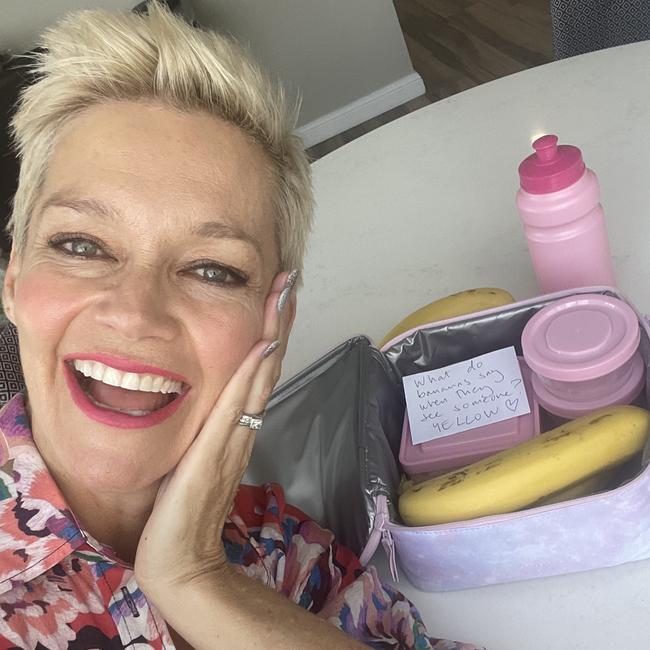‘Don’t tell them to believe in themselves’: Dr Justin Coulson’s tips for boosting kids’ self-belief
Amid Covid, social media and parental pressure, Aussie schoolkids face a self-belief crisis. See Dr Justin Coulson’s advice for mums and dads.
SmartDaily
Don't miss out on the headlines from SmartDaily. Followed categories will be added to My News.
Aussie kids are facing a self-belief crisis, with new research revealing high school students in particular have low positivity and self-esteem.
But there are ways parents can prepare their children for the start of the school year and get their self-belief back on track for 2022.
A survey of 27,000 students by Forge Wellbeing for The Weet-Bix Feed Their Belief report shows 91 per cent of kindergarten students feel optimistic, but this drops to 70 per cent for Year 7 students and just 50 per cent for Year 12.
The portion who report feeling positive about their self-esteem also plummets 15 per cent between the start of high school and the end.
THE AGE FACTOR
Parenting expert Dr Justin Coulson says there are many reasons optimism and self-esteem drop as children get older.
“They become more self-aware of what they have got and their capabilities compared to others,” he says.
“They recognise someone has more friends than them or is better at sports than them or is more attractive than them.”

Coulson says older children also start to wrestle with questions of identity.
“Social media is playing a part here but this phenomenon predates social media,” he says.
“Another reason – which is hard for parents to hear – is that our expectations of our children have changed.
“The pressure to do well at school, conform to standards and live up to expectations is measurably higher.
“As parents we have become less ‘autonomy supportive’.
“This kind of parenting where we make more decisions for them is associated with lower self-esteem, lower hopes for the future and they don’t feel as confident about life.”
Coulson says older children are also more aware of global issues – such as climate change, the pandemic and social injustice – and family issues, such as a sibling’s depression or whether their parents will split up.
WHY IT MATTERS
Kids who believe in themselves are more resilient, Coulson says.
They are the ones who give things a try.
“They have more self-efficacy which is this feeling of, ‘If there is a task in front of me, I can figure out a way to get it done’,” he says.
“Even if you don’t accomplish everything you want to … trying gets you further along the path towards your dreams than not trying.”

WHAT WE CAN DO ABOUT IT
Don’t tell them to believe in themselves
Similarly, don’t tell them to cheer up or that everything is going to work out OK, Coulson advises.
“When someone tells you what to believe, there is something inside you that tends to push back, bristle a little bit, and think, ‘Don’t tell me you understand, you don’t’,” he says.
Do ask them how they feel
Coulson says children respond best to a parent who sits beside them and asks how they are feeling, or says “I can see you are worried about this”.
“Describe what you are seeing in kind, compassionate and empathetic terms, then ask them what they think they can do,” he says.
“When we say, ‘What do you think?’ we show we believe they have the capability to figure this out themselves and nothing feeds the belief in kids more than knowing their parents believe in them.”
Do reflect on past challenges
If your child is not sure what to do about a problem, Coulson recommends reflecting on other times they were stuck and how they got out of that situation.
“When they know they got through hard times before, they know they can get through them again,” he says.
“If they really can’t do it on their own, give them autonomy by saying, ‘You tell me what you will do and tell me what you need help with’ – offer support and show you believe in them.”
Don’t tell them to be excited
“There is going to be so many kids who are nervous about going back to school – worried about friendships, classes or that they are going to get Covid and bring it back to their parents, uncles, aunties and grandparents,” he says.
“At no point do we want to tell them how they should be feeling or what they should be looking forward to or why their feelings are wrong.
“It undermines their self belief because they are told to think and feel something different to what they think and feel.”

A NERVOUS RETURN TO IN-PERSON CLASSES
TV personality and mother of two Jess Rowe is being proactive to make sure her girls are comfortable and ready to return to the classroom.
Her favourite way to check in and connect with Allegra, 15, and Giselle, 12, is to chat while walking to school or in the car together.
“I also love leaving a note in their lunch boxes,” she says.
The Australian Bananas Back to School research reveals almost half of parents (43 per cent) think their child is nervous about returning to face-to-face learning this year, and 34 per cent believe they are worried about striking up conversations and making new friends.
“I used to get anxious heading back to school and I still clearly remember the dread in my stomach as my seemingly never-ending summer holiday was drawing to a close,” Rowe says.
“I never slept well the night before but found once I got back into the routine it was always better than I had imagined.”
If children are worried about making friends, she says it can be a good idea to come up with simple conversation ideas before day one.
“Obviously those topics depend on their ages (but) things like favourite songs, pets and jokes could be a good starting point,” she says.
“As a grown-up I also wondered how I’d go with face-to-face conversation again and I think sharing that with your kids shows them you understand what they might be experiencing too.”




